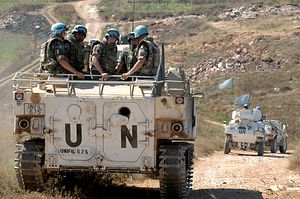The government of Kazakhstan has announced that Kazakh peacekeepers will be deployed to the UN Interim Force in Lebanon (UNIFIL) by the end of April; the troops will replace the first-ever major contingent of Kazakh peacekeepers deployed this past October. This is an important development as the Central Asian state firmly joins the ranks of contributors to UN peace missions.
Kazakhstan has participated in UN peace missions for several years, but it has been at a very low scale. Until last year’s deployment to Lebanon, Kazakh participation exclusively consisted of a small number of either experts on mission or police officers, particularly to the UN mission in Western Sahara (MINURSO). The October 2018 arrival of 120 Kazakh troops to UNIFIL, thus, was the country’s first ever significant contingent of troops to UN missions.
This growing role in UN peace operations is part of Astana’s objective to increase its international image. For example, Kazakhstan held one of the rotating seats of the UN Security Council in 2017-2018, the first Central Asian nation to do so. It held the UNSC’s rotating presidency in January 2018.
Without a doubt, we should not expect Kazakhstan to start deploying its troops to other UN missions. An important reason why UNIFIL was selected is because this operation is fairly peaceful. While the region has experienced violence in the recent past, like the 2006 Lebanon War and the 2010 Israel-Lebanon border clashes, UNIFIL is much safer than other UN missions. For example a recent incident occurred this past November in the Democratic Republic of Congo, where “one Tanzanian and six Malawian ‘blue helmets’” belonging to MONUSCO were killed by FARDC rebels. It is unlikely that Astana would want to expose its troops to conflict areas where the risk of Kazakh peacekeepers losing their lives is much higher.
Such a situation played out in the not too distant past. In the 1990s, Kazakhstan sent troops to Tajikistan during that nation’s civil war; they operated under the banner of the Commonwealth of Independent States’ Collective Peacekeeping Forces. On April 7, 1995, Kazakhs troops were attacked by Tajik opposition forces, resulting in the deaths of 17 peacekeepers. Overall some 40 Kazakh troops lost their lives in Tajikistan.
Another reason Kazakhstan’s participation is calculated and limited is that its capabilities and experience are also limited. Kazakhstan has fairly modern armed forces, and the United States, particularly via the State Department’s Global Peace Operations Initiative, has assisted Astana in setting up its peacekeeping training center. However, Kazakhstan is still very young when it comes to major deployments to UN peace missions. Hence, it is unlikely that the country has the capabilities to carry out two simultaneous deployments at the present time. The fact that the Kazakh company in UNIFIL is operating under the direction of the Indian Battalion in Ibl al-Saqi, southeastern Lebanon, suggests that Kazakh peacekeepers still have much to learn before operating independently in the field.
There is one final aspect to this equation that is worth mentioning: The United Nations needs more troop and police contributors that provide professional and capable personnel to its peacekeeping operations. A quick perusal of the UN data shows that, as of January 31, the usual suspects remain the main contributors of police and military personnel. African and South Asian nations like Ethiopia, Bangladesh, Rwanda, India, Nepal, and Pakistan continue to constitute the top contributors, in descending order. While the commitment of these governments and troops to spreading peace is praiseworthy, there are also plenty of criticisms and controversies about the behavior of these troops while abroad. For example, in 2012 two Pakistani peacekeepers were found guilty of raping a 14-year-old Haitian boy during their deployment to MINUSTAH. Nepali peacekeepers have been accused of bringing cholera to Haiti.
Thus, should Kazakh troops perform as expected in UNIFIL, the international community should support the training of more peacekeepers and encourage Astana to participate in other UN missions. This would certainly not be easy as there are plenty of issues to keep in mind, such as the UN peacekeeping budget, whether or not Kazakh troops perform adequately in Lebanon, and whether Astana would want to deploy additional troops to more violence-prone operations.
There are plenty of moving parts to take into account when we discuss Kazakhstan’s participation in UN peacekeeping operations. It will be important to monitor how Kazakh troops continue to perform in UNIFIL as this may set the stage for participation in other missions, which the UN would certainly benefit from.
Wilder Alejandro Sanchez is an analyst who focuses on geopolitical, military, and cybersecurity issues.
The views expressed in this article are those of the author alone and do not reflect those of any institutions with which the author is associated.

































